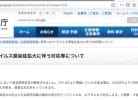I. Extending The Period for Non-Japanese Applicants for Filing an Appeal Against An Examiner’s Final Decision of Rejection From Three Months to Four (effective April 1, 2009)
Background and New Rules:
The Japan Patent Office’s (JPO) new guidelines for filing an appeal against an examiner’s “Notice of Final Refusal” will go into effect April 1, 2009. The JPO is responding to a long-standing complaint among Japanese applicants who’ve been frustrated by the disparity between the time allotted by other international patent offices and the JPO; on average, the other offices allows 1 or 2 months longer to file a demand compared to the JPO’s 30 days.
Therefore, beginning April 1st, the JPO will extend the filing period from its current 30 days to 3 months for Japanese applicants, and from the current 3 months to 4 months for the overseas counterparts. The details are as follows:
A. Japanese Applicants
The period for filing an appeal against an examiner’s final decision of rejection for patents, designs and trademark applications, as well as the period for filing an appeal against an examiner’s final decision of rejection for a dismissal of an amendment for Japanese design and trademark applications, will be extended from 30 days to 3 months.
B. Overseas Applicants
(1) Patents:
(Existing Rule) The current period for filing an appeal against an examiner’s final decision of rejection is a maximum of 90 days (a basic 30-day period with an option for a 60-day extension,) plus another 30 days to file an amendment after the request for an appeal is made. Therefore, the total timeframe to file an amendment from the time the examiner’s final decision of rejection is sent is 120 days (90 days + 30 days.)
(2) Designs and Trademarks :
(New Rule) The new rule extends the period to file an appeal from 90 days to four months (the basic three months with an option for a one month extension.) However, unlike the existing rule in which the applicant submits an amendment 30 days after the appeal is made, the new rule requires that the amendment is submitted concurrently with the request for an appeal within the four month period. Note also that the unit for calculation has been changed from days to months.
II. Increasing the number of foreign Intellectual Property Offices to Participate in Electronically Transferred Priority Documents (effective April 1, 2009)
The JPO has expanded the number of foreign intellectual property offices permitted to transfer electronically certified copies of priority documents. In order to support a smooth application process and a smooth administrative procedure, not only will priority documents from the original countries be accepted, but electronic transfer of priority documents from other international offices will also be accepted.
III. New Licensee Protection Through Provisional License Registration and Denial of Public Access to
Privileged License Information (effective April 1, 2009)
Background and New Rules:
(1) The pending period beginning with the filing of a patent application to receiving a patent can take several years. However, the need to license the right to patent before a patent is granted is on the rise in Japan. This need is greatest for university TLOs, university spinouts, and other venture companies because such applicants need to start collecting royalties early in the application process, so as to supplement continued research. In Japan, license agreements for pending patents do not provide executory protection for licensees in the event the licensor goes bankrupt. The licensor in such a case can assign the license agreement to a third party, resulting in two possible outcomes: Termination of the license causing the licensee to lose rights over the licensed technology, or altering the license in contravention of the license terms.
Therefore, the proposed new regulation will put in place a registration system in which license agreements for patent pending applications can be filed with the JPO as a “provisional license,” thus protecting the licensee’s licensing rights against the new owner’s injunction, demand for compensation, or contract annulment. This new regulation will go into effect in January of next year.
(2) In response to an ever-greater demand for licensee protection, the JPO has introduced a revision in the current non-exclusive license registration’s license disclosure requirement. All except to the parties involved, the new regulation makes inaccessible certain sensitive information to the general public. The following information will be considered privileged starting January 1, 2009: the licensee’s name, the license’s scope of claim, and the name of the bankruptcy administrator.
(*Note: Exclusive licenses confer rights to the exclusion of all others with a serious impact on other parties. Therefore, its disclosure requirements will remain the same.)
(Posted February 3, 2009)






